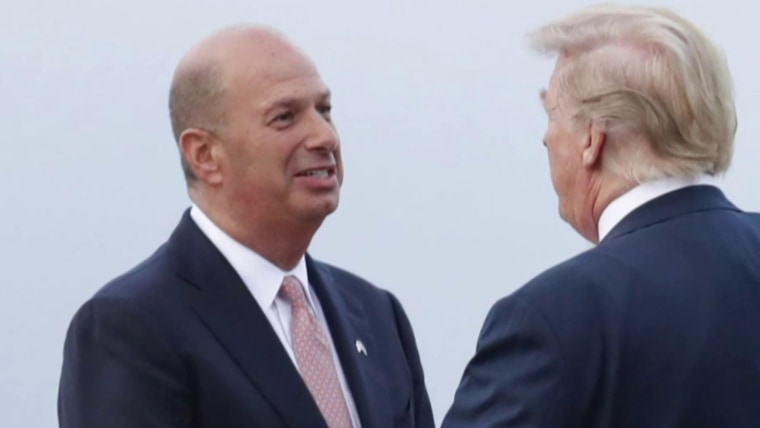Exactly one month ago this morning, Donald Trump had a very high opinion of Gordon Sondland, a Republican megadonor the president chose to serve as U.S. Ambassador to the European Union. Trump described him as "a really good man" and a "great American."
And yet, despite the president's self-proclaimed great memory, he had a different recollection of Sondland during a brief Q&A with reporters this morning:
QUESTION: Gordon Sondland said at the beginning of September he presumed there was a quid pro quo. Then there was a telephone call to you on the September 9th. Had he ever talked to you prior to that telephone call?TRUMP: Let me just tell you, I hardly know the gentleman. But this is the man who said there was no quid pro quo, and he still says that.... Everybody that's testified, even the ones that are Trump haters, they've all been fine. They don't have anything.
For now, let's put aside how spectacularly wrong the president is about the depositions in the impeachment inquiry, which even some Republicans have conceded paint a rather brutal picture for the White House. Let's instead focus on Trump's perspective as it relates to Sondland.
We know the president spoke to the ambassador over the phone. We know the president praised Sondland on Twitter. We even know that the Republican donor, who reportedly gave $1 million to the president's inaugural committee, is one of "a small cadre of ambassadors who enjoy direct and frequent access to Trump."
We also know, of course, that Sondland is a key figure in the impeachment inquiry who revised his congressional testimony this week to alert lawmakers to the fact that there was, in fact, a quid pro quo.
I can understand why Trump suddenly wants to pretend he "hardly knows the gentleman," but it's far too late for that.
This is, however, part of an amazing pattern for the president, who routinely pretends to forget his associates at the first sign of trouble.
Just recently, for example, Trump said he didn't know Igor Fruman and Lev Parnas after their arrests, despite his previous interactions with them. Of course, they shouldn't feel too bad about this, since this is the line the president always takes.
As regular readers may recall, after his former personal attorney, Michael Cohen, directly implicated Trump in a felony, the president argued, in reference to the former vice president of the Trump Organization, "Michael Cohen was a PR person who did small legal work, very small legal work."
Around the same time, in the wake of Jamal Khashoggi's murder, Trump reportedly told associates he "barely knows" Mohammed bin Salman.
But that's just the start of the list. When Paul Manafort was indicted, for example, Trump’s former campaign chairman became some random staffer “who played a very limited role for a very limited amount of time.”
When White House National Security Adviser Michael Flynn was forced to resign in disgrace, Team Trump decided he was “a former Obama administration official” who did some “volunteer” work for the president.
Carter Page was described as someone Trump “does not know.” George Papadopoulos was dismissed as a “coffee boy.” Trump World even tried to downplay its association with Cambridge Analytica, the Trump campaign’s data firm.
No one outside the White House ever takes this rhetoric seriously, but it’s obviously on the first page of Trump’s playbook, unveiled even when everyone knows it's laughable.
